Organisational Behaviour in Next Plc: A Detailed Report
VerifiedAdded on 2022/11/24
|16
|3336
|226
Report
AI Summary
This report provides a detailed analysis of organisational behaviour within Next Plc, a multinational retail firm. It explores the influence of organisational culture, politics, and power on individual and team performance, referencing Handy's model for cultural analysis. The report delves into content and process theories of motivation, including Maslow's hierarchy of needs, Herzberg's two-factor theory, Adams' equity theory, and Vroom's expectancy theory, assessing their relevance to Next Plc. Furthermore, it contrasts effective and ineffective teams, and applies Belbin's theory of team roles. The report concludes with recommendations and a reflective statement, offering insights into enhancing organisational behaviour within the company.
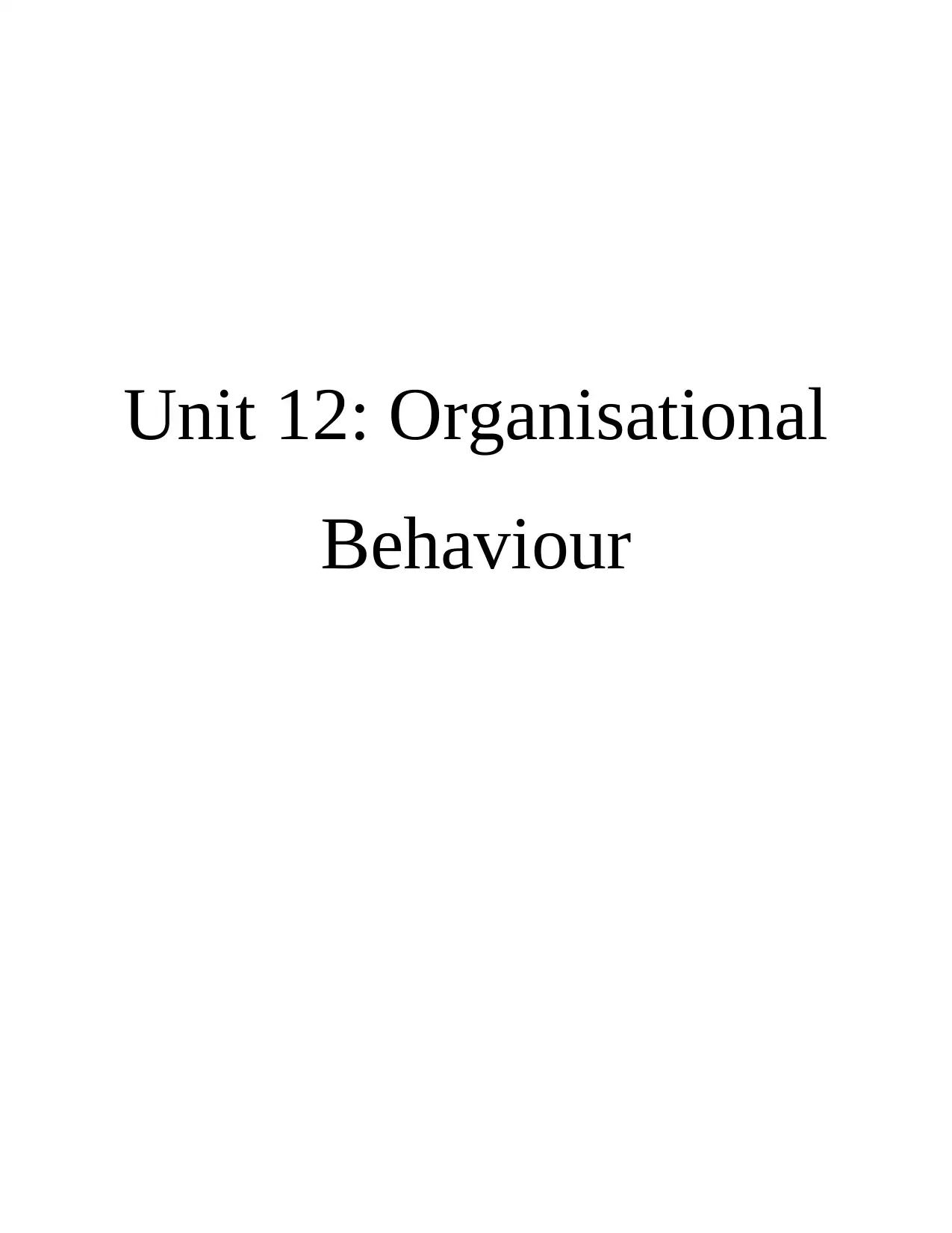
Unit 12: Organisational
Behaviour
Behaviour
Paraphrase This Document
Need a fresh take? Get an instant paraphrase of this document with our AI Paraphraser
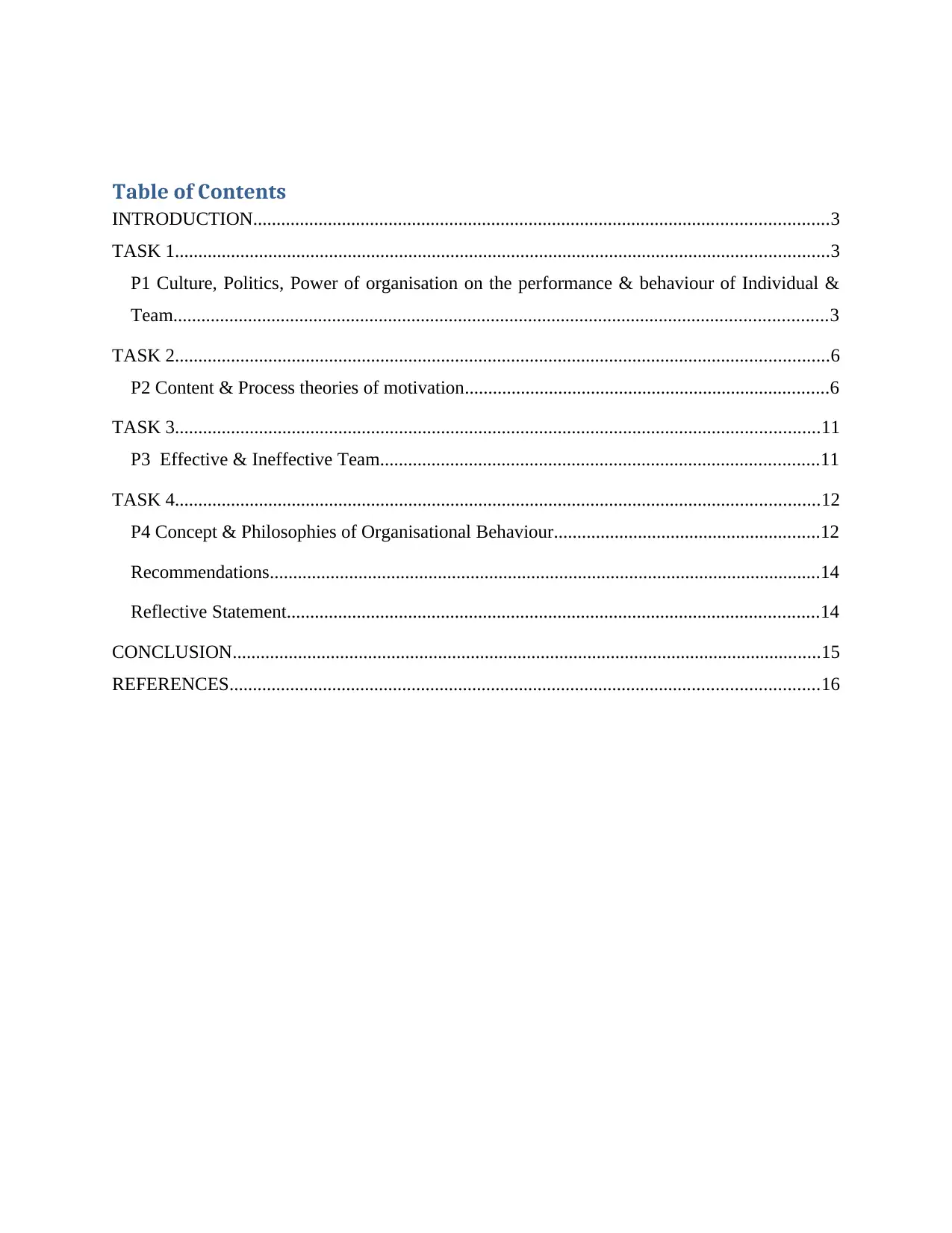
Table of Contents
INTRODUCTION...........................................................................................................................3
TASK 1............................................................................................................................................3
P1 Culture, Politics, Power of organisation on the performance & behaviour of Individual &
Team............................................................................................................................................3
TASK 2............................................................................................................................................6
P2 Content & Process theories of motivation..............................................................................6
TASK 3..........................................................................................................................................11
P3 Effective & Ineffective Team..............................................................................................11
TASK 4..........................................................................................................................................12
P4 Concept & Philosophies of Organisational Behaviour.........................................................12
Recommendations......................................................................................................................14
Reflective Statement..................................................................................................................14
CONCLUSION..............................................................................................................................15
REFERENCES..............................................................................................................................16
INTRODUCTION...........................................................................................................................3
TASK 1............................................................................................................................................3
P1 Culture, Politics, Power of organisation on the performance & behaviour of Individual &
Team............................................................................................................................................3
TASK 2............................................................................................................................................6
P2 Content & Process theories of motivation..............................................................................6
TASK 3..........................................................................................................................................11
P3 Effective & Ineffective Team..............................................................................................11
TASK 4..........................................................................................................................................12
P4 Concept & Philosophies of Organisational Behaviour.........................................................12
Recommendations......................................................................................................................14
Reflective Statement..................................................................................................................14
CONCLUSION..............................................................................................................................15
REFERENCES..............................................................................................................................16
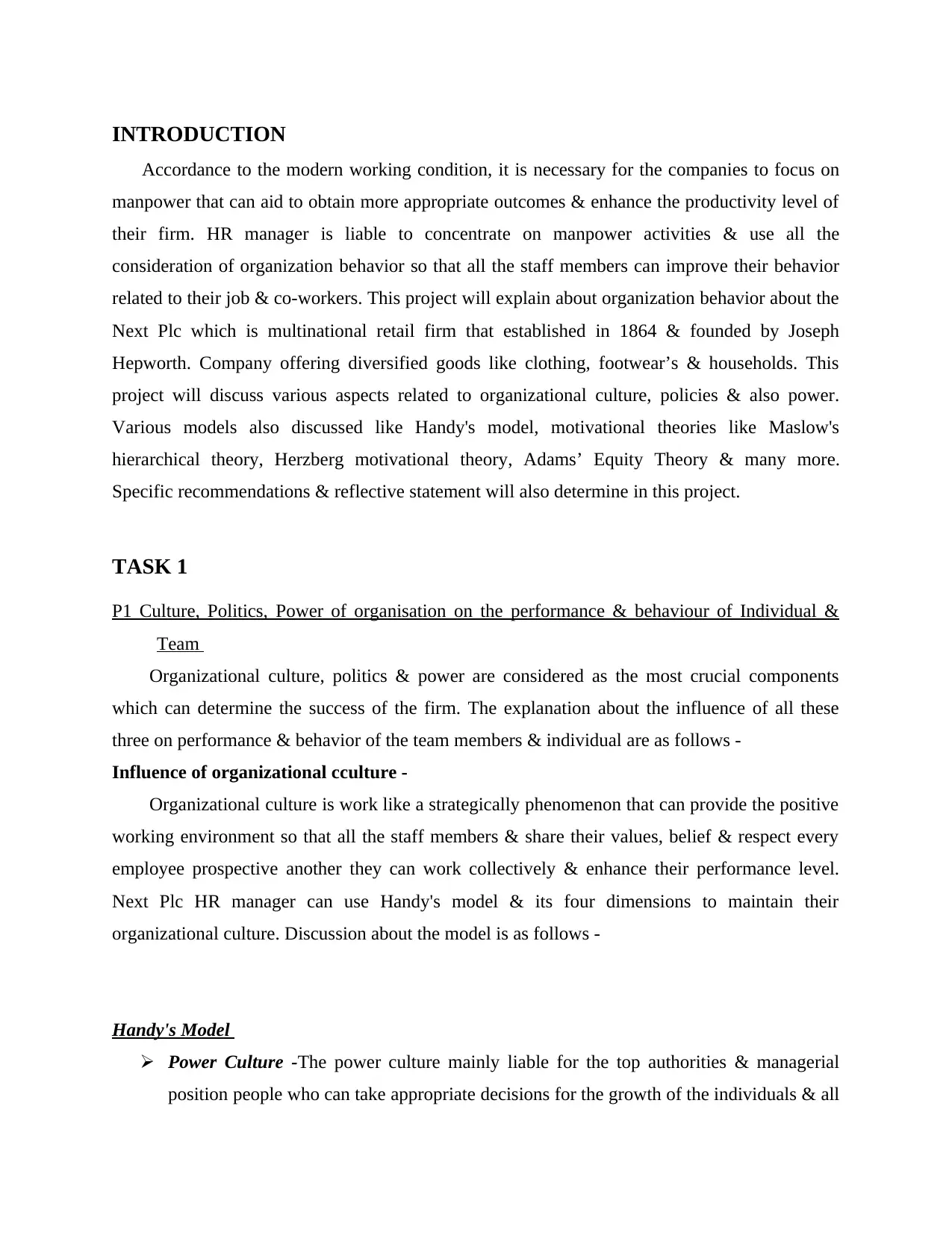
INTRODUCTION
Accordance to the modern working condition, it is necessary for the companies to focus on
manpower that can aid to obtain more appropriate outcomes & enhance the productivity level of
their firm. HR manager is liable to concentrate on manpower activities & use all the
consideration of organization behavior so that all the staff members can improve their behavior
related to their job & co-workers. This project will explain about organization behavior about the
Next Plc which is multinational retail firm that established in 1864 & founded by Joseph
Hepworth. Company offering diversified goods like clothing, footwear’s & households. This
project will discuss various aspects related to organizational culture, policies & also power.
Various models also discussed like Handy's model, motivational theories like Maslow's
hierarchical theory, Herzberg motivational theory, Adams’ Equity Theory & many more.
Specific recommendations & reflective statement will also determine in this project.
TASK 1
P1 Culture, Politics, Power of organisation on the performance & behaviour of Individual &
Team
Organizational culture, politics & power are considered as the most crucial components
which can determine the success of the firm. The explanation about the influence of all these
three on performance & behavior of the team members & individual are as follows -
Influence of organizational cculture -
Organizational culture is work like a strategically phenomenon that can provide the positive
working environment so that all the staff members & share their values, belief & respect every
employee prospective another they can work collectively & enhance their performance level.
Next Plc HR manager can use Handy's model & its four dimensions to maintain their
organizational culture. Discussion about the model is as follows -
Handy's Model
Power Culture -The power culture mainly liable for the top authorities & managerial
position people who can take appropriate decisions for the growth of the individuals & all
Accordance to the modern working condition, it is necessary for the companies to focus on
manpower that can aid to obtain more appropriate outcomes & enhance the productivity level of
their firm. HR manager is liable to concentrate on manpower activities & use all the
consideration of organization behavior so that all the staff members can improve their behavior
related to their job & co-workers. This project will explain about organization behavior about the
Next Plc which is multinational retail firm that established in 1864 & founded by Joseph
Hepworth. Company offering diversified goods like clothing, footwear’s & households. This
project will discuss various aspects related to organizational culture, policies & also power.
Various models also discussed like Handy's model, motivational theories like Maslow's
hierarchical theory, Herzberg motivational theory, Adams’ Equity Theory & many more.
Specific recommendations & reflective statement will also determine in this project.
TASK 1
P1 Culture, Politics, Power of organisation on the performance & behaviour of Individual &
Team
Organizational culture, politics & power are considered as the most crucial components
which can determine the success of the firm. The explanation about the influence of all these
three on performance & behavior of the team members & individual are as follows -
Influence of organizational cculture -
Organizational culture is work like a strategically phenomenon that can provide the positive
working environment so that all the staff members & share their values, belief & respect every
employee prospective another they can work collectively & enhance their performance level.
Next Plc HR manager can use Handy's model & its four dimensions to maintain their
organizational culture. Discussion about the model is as follows -
Handy's Model
Power Culture -The power culture mainly liable for the top authorities & managerial
position people who can take appropriate decisions for the growth of the individuals & all
⊘ This is a preview!⊘
Do you want full access?
Subscribe today to unlock all pages.

Trusted by 1+ million students worldwide
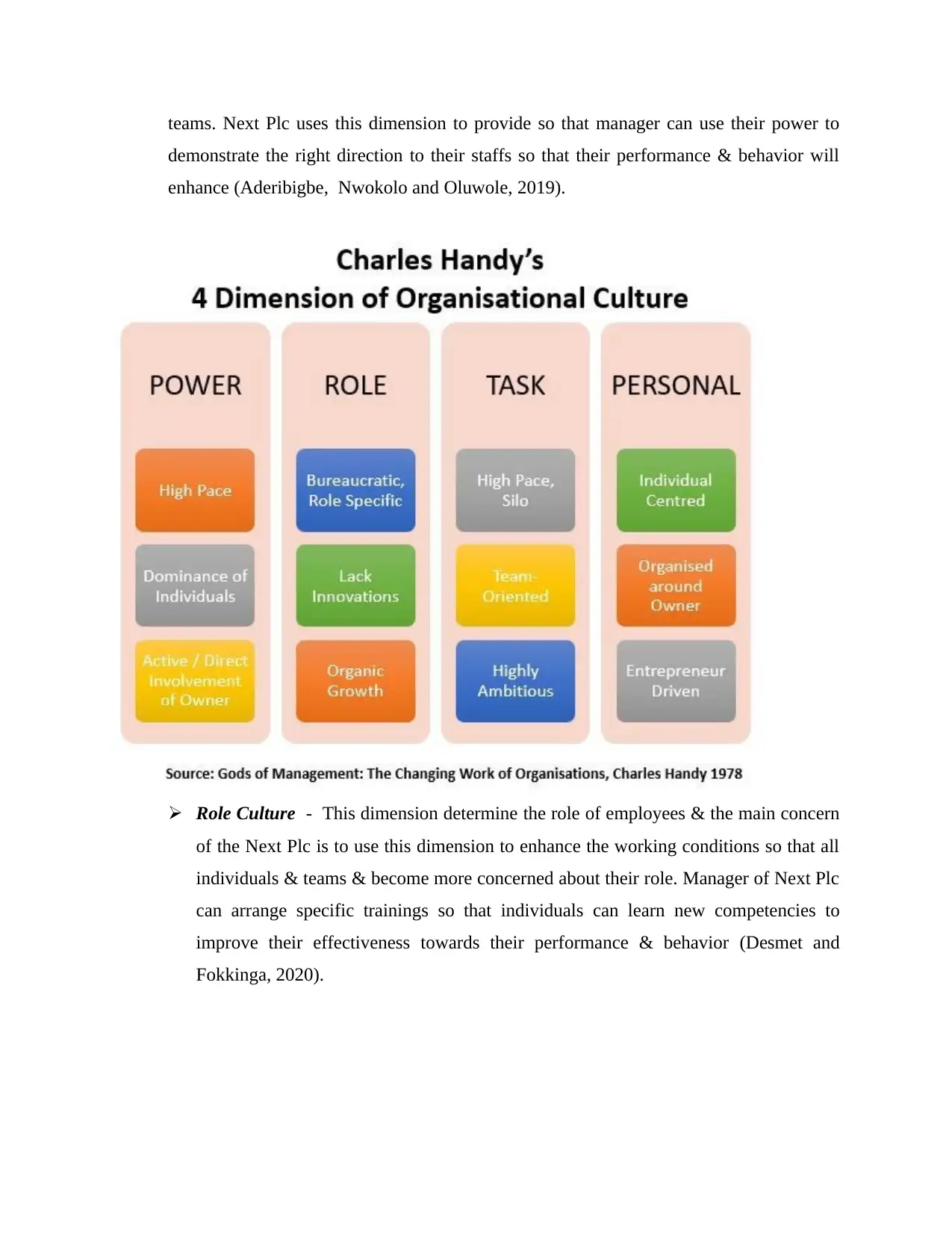
teams. Next Plc uses this dimension to provide so that manager can use their power to
demonstrate the right direction to their staffs so that their performance & behavior will
enhance (Aderibigbe, Nwokolo and Oluwole, 2019).
Role Culture - This dimension determine the role of employees & the main concern
of the Next Plc is to use this dimension to enhance the working conditions so that all
individuals & teams & become more concerned about their role. Manager of Next Plc
can arrange specific trainings so that individuals can learn new competencies to
improve their effectiveness towards their performance & behavior (Desmet and
Fokkinga, 2020).
demonstrate the right direction to their staffs so that their performance & behavior will
enhance (Aderibigbe, Nwokolo and Oluwole, 2019).
Role Culture - This dimension determine the role of employees & the main concern
of the Next Plc is to use this dimension to enhance the working conditions so that all
individuals & teams & become more concerned about their role. Manager of Next Plc
can arrange specific trainings so that individuals can learn new competencies to
improve their effectiveness towards their performance & behavior (Desmet and
Fokkinga, 2020).
Paraphrase This Document
Need a fresh take? Get an instant paraphrase of this document with our AI Paraphraser
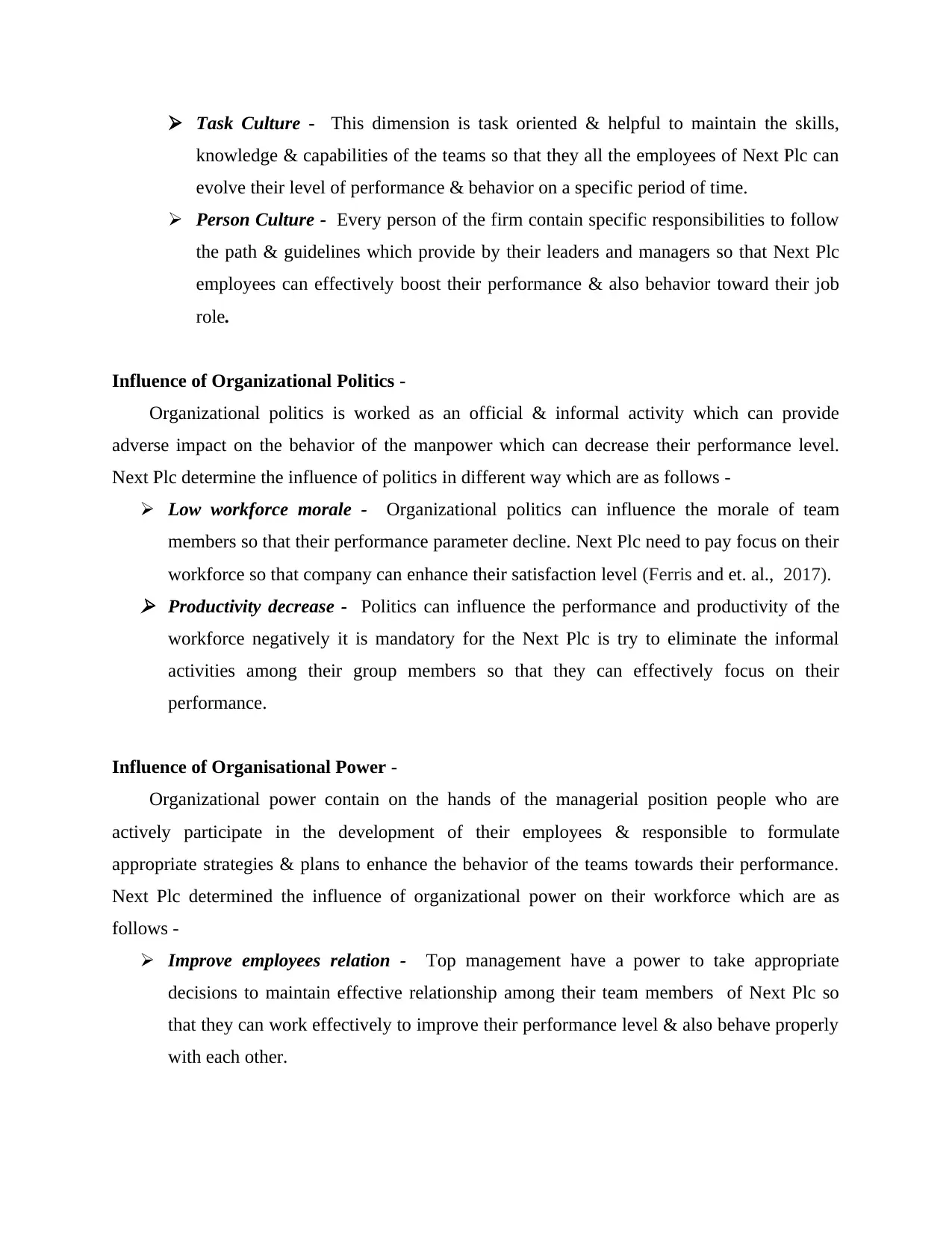
Task Culture - This dimension is task oriented & helpful to maintain the skills,
knowledge & capabilities of the teams so that they all the employees of Next Plc can
evolve their level of performance & behavior on a specific period of time.
Person Culture - Every person of the firm contain specific responsibilities to follow
the path & guidelines which provide by their leaders and managers so that Next Plc
employees can effectively boost their performance & also behavior toward their job
role.
Influence of Organizational Politics -
Organizational politics is worked as an official & informal activity which can provide
adverse impact on the behavior of the manpower which can decrease their performance level.
Next Plc determine the influence of politics in different way which are as follows -
Low workforce morale - Organizational politics can influence the morale of team
members so that their performance parameter decline. Next Plc need to pay focus on their
workforce so that company can enhance their satisfaction level (Ferris and et. al., 2017). Productivity decrease - Politics can influence the performance and productivity of the
workforce negatively it is mandatory for the Next Plc is try to eliminate the informal
activities among their group members so that they can effectively focus on their
performance.
Influence of Organisational Power -
Organizational power contain on the hands of the managerial position people who are
actively participate in the development of their employees & responsible to formulate
appropriate strategies & plans to enhance the behavior of the teams towards their performance.
Next Plc determined the influence of organizational power on their workforce which are as
follows -
Improve employees relation - Top management have a power to take appropriate
decisions to maintain effective relationship among their team members of Next Plc so
that they can work effectively to improve their performance level & also behave properly
with each other.
knowledge & capabilities of the teams so that they all the employees of Next Plc can
evolve their level of performance & behavior on a specific period of time.
Person Culture - Every person of the firm contain specific responsibilities to follow
the path & guidelines which provide by their leaders and managers so that Next Plc
employees can effectively boost their performance & also behavior toward their job
role.
Influence of Organizational Politics -
Organizational politics is worked as an official & informal activity which can provide
adverse impact on the behavior of the manpower which can decrease their performance level.
Next Plc determine the influence of politics in different way which are as follows -
Low workforce morale - Organizational politics can influence the morale of team
members so that their performance parameter decline. Next Plc need to pay focus on their
workforce so that company can enhance their satisfaction level (Ferris and et. al., 2017). Productivity decrease - Politics can influence the performance and productivity of the
workforce negatively it is mandatory for the Next Plc is try to eliminate the informal
activities among their group members so that they can effectively focus on their
performance.
Influence of Organisational Power -
Organizational power contain on the hands of the managerial position people who are
actively participate in the development of their employees & responsible to formulate
appropriate strategies & plans to enhance the behavior of the teams towards their performance.
Next Plc determined the influence of organizational power on their workforce which are as
follows -
Improve employees relation - Top management have a power to take appropriate
decisions to maintain effective relationship among their team members of Next Plc so
that they can work effectively to improve their performance level & also behave properly
with each other.
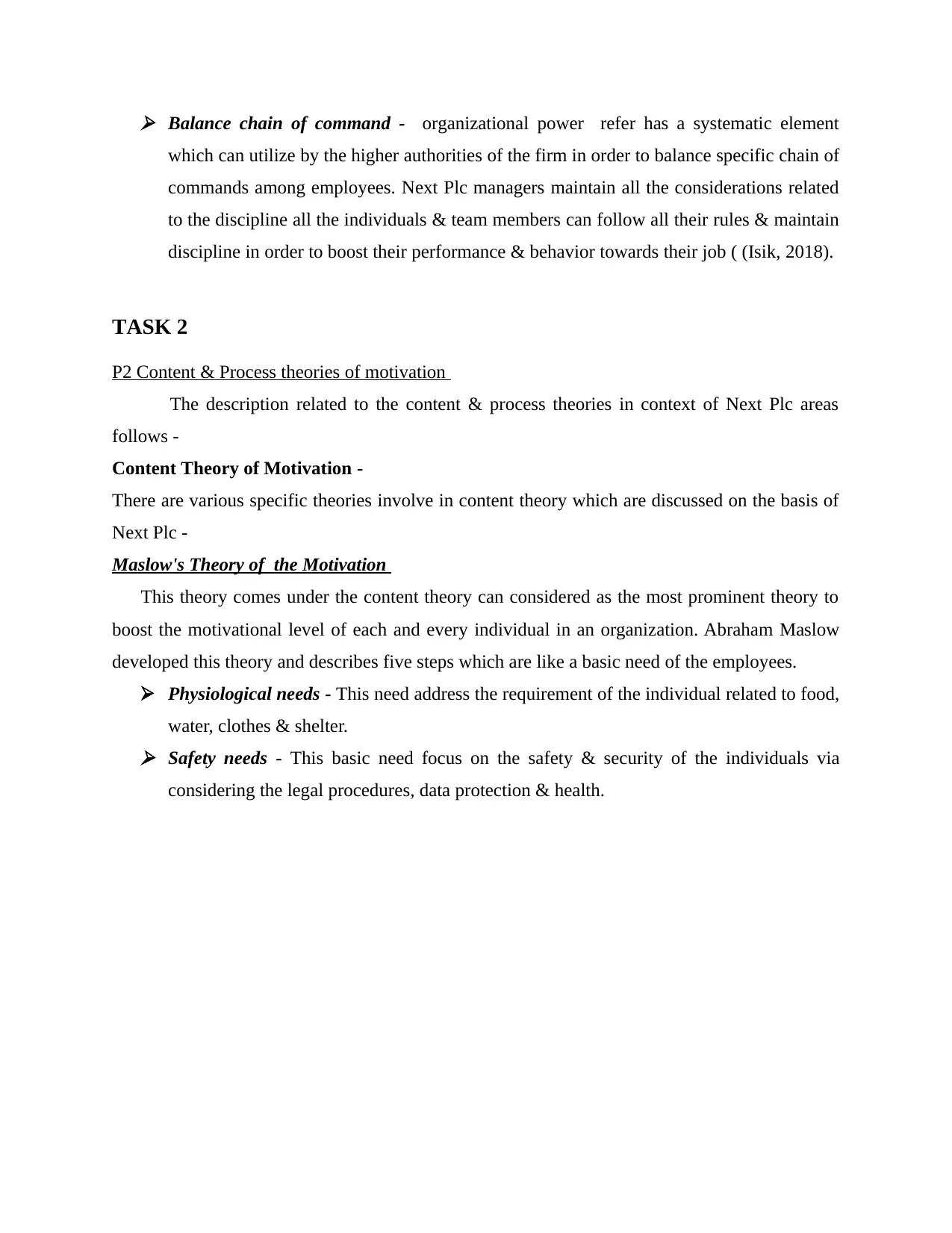
Balance chain of command - organizational power refer has a systematic element
which can utilize by the higher authorities of the firm in order to balance specific chain of
commands among employees. Next Plc managers maintain all the considerations related
to the discipline all the individuals & team members can follow all their rules & maintain
discipline in order to boost their performance & behavior towards their job ( (Isik, 2018).
TASK 2
P2 Content & Process theories of motivation
The description related to the content & process theories in context of Next Plc areas
follows -
Content Theory of Motivation -
There are various specific theories involve in content theory which are discussed on the basis of
Next Plc -
Maslow's Theory of the Motivation
This theory comes under the content theory can considered as the most prominent theory to
boost the motivational level of each and every individual in an organization. Abraham Maslow
developed this theory and describes five steps which are like a basic need of the employees.
Physiological needs - This need address the requirement of the individual related to food,
water, clothes & shelter. Safety needs - This basic need focus on the safety & security of the individuals via
considering the legal procedures, data protection & health.
which can utilize by the higher authorities of the firm in order to balance specific chain of
commands among employees. Next Plc managers maintain all the considerations related
to the discipline all the individuals & team members can follow all their rules & maintain
discipline in order to boost their performance & behavior towards their job ( (Isik, 2018).
TASK 2
P2 Content & Process theories of motivation
The description related to the content & process theories in context of Next Plc areas
follows -
Content Theory of Motivation -
There are various specific theories involve in content theory which are discussed on the basis of
Next Plc -
Maslow's Theory of the Motivation
This theory comes under the content theory can considered as the most prominent theory to
boost the motivational level of each and every individual in an organization. Abraham Maslow
developed this theory and describes five steps which are like a basic need of the employees.
Physiological needs - This need address the requirement of the individual related to food,
water, clothes & shelter. Safety needs - This basic need focus on the safety & security of the individuals via
considering the legal procedures, data protection & health.
⊘ This is a preview!⊘
Do you want full access?
Subscribe today to unlock all pages.

Trusted by 1+ million students worldwide
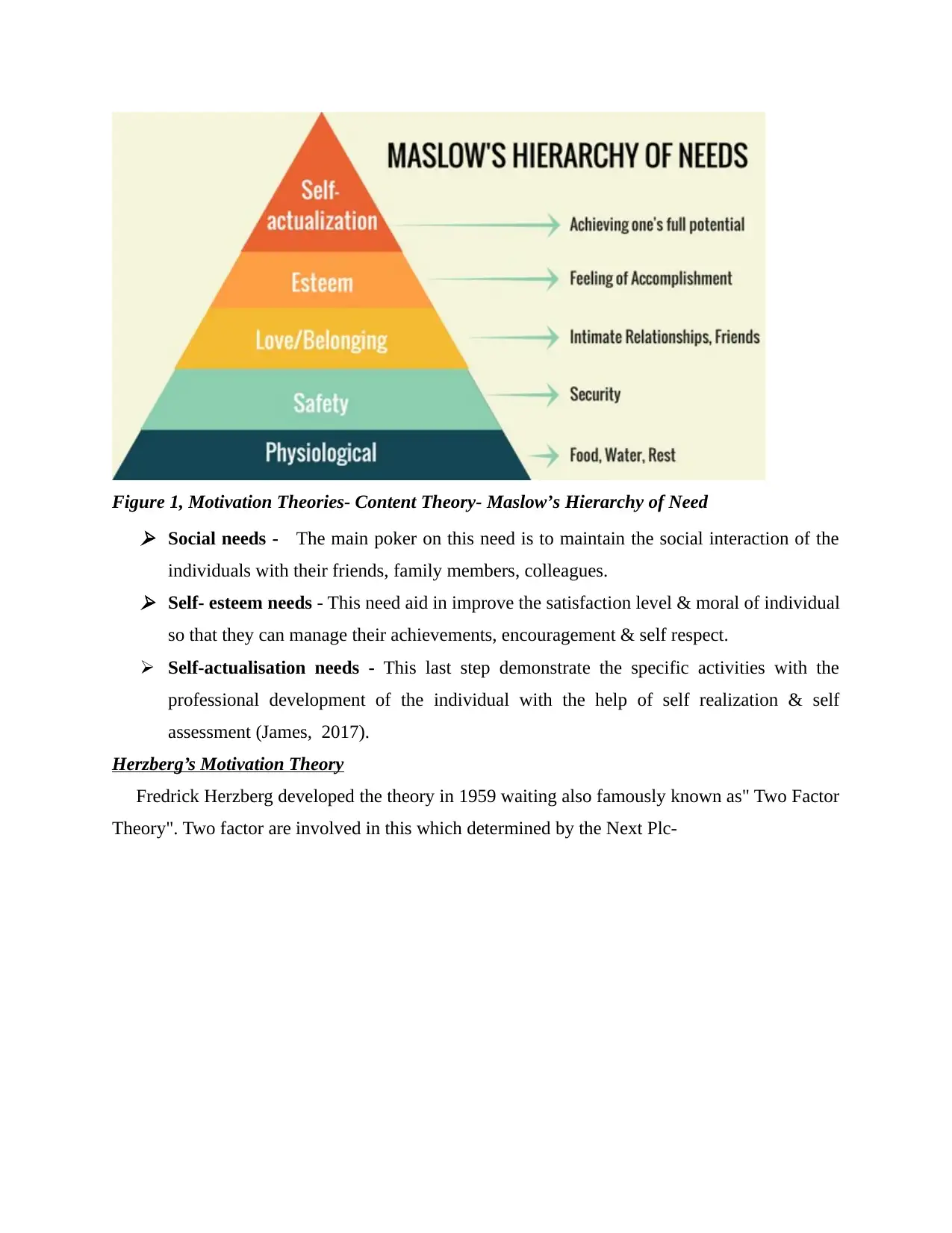
Figure 1, Motivation Theories- Content Theory- Maslow’s Hierarchy of Need Social needs - The main poker on this need is to maintain the social interaction of the
individuals with their friends, family members, colleagues. Self- esteem needs - This need aid in improve the satisfaction level & moral of individual
so that they can manage their achievements, encouragement & self respect.
Self-actualisation needs - This last step demonstrate the specific activities with the
professional development of the individual with the help of self realization & self
assessment (James, 2017).
Herzberg’s Motivation Theory
Fredrick Herzberg developed the theory in 1959 waiting also famously known as" Two Factor
Theory". Two factor are involved in this which determined by the Next Plc-
individuals with their friends, family members, colleagues. Self- esteem needs - This need aid in improve the satisfaction level & moral of individual
so that they can manage their achievements, encouragement & self respect.
Self-actualisation needs - This last step demonstrate the specific activities with the
professional development of the individual with the help of self realization & self
assessment (James, 2017).
Herzberg’s Motivation Theory
Fredrick Herzberg developed the theory in 1959 waiting also famously known as" Two Factor
Theory". Two factor are involved in this which determined by the Next Plc-
Paraphrase This Document
Need a fresh take? Get an instant paraphrase of this document with our AI Paraphraser
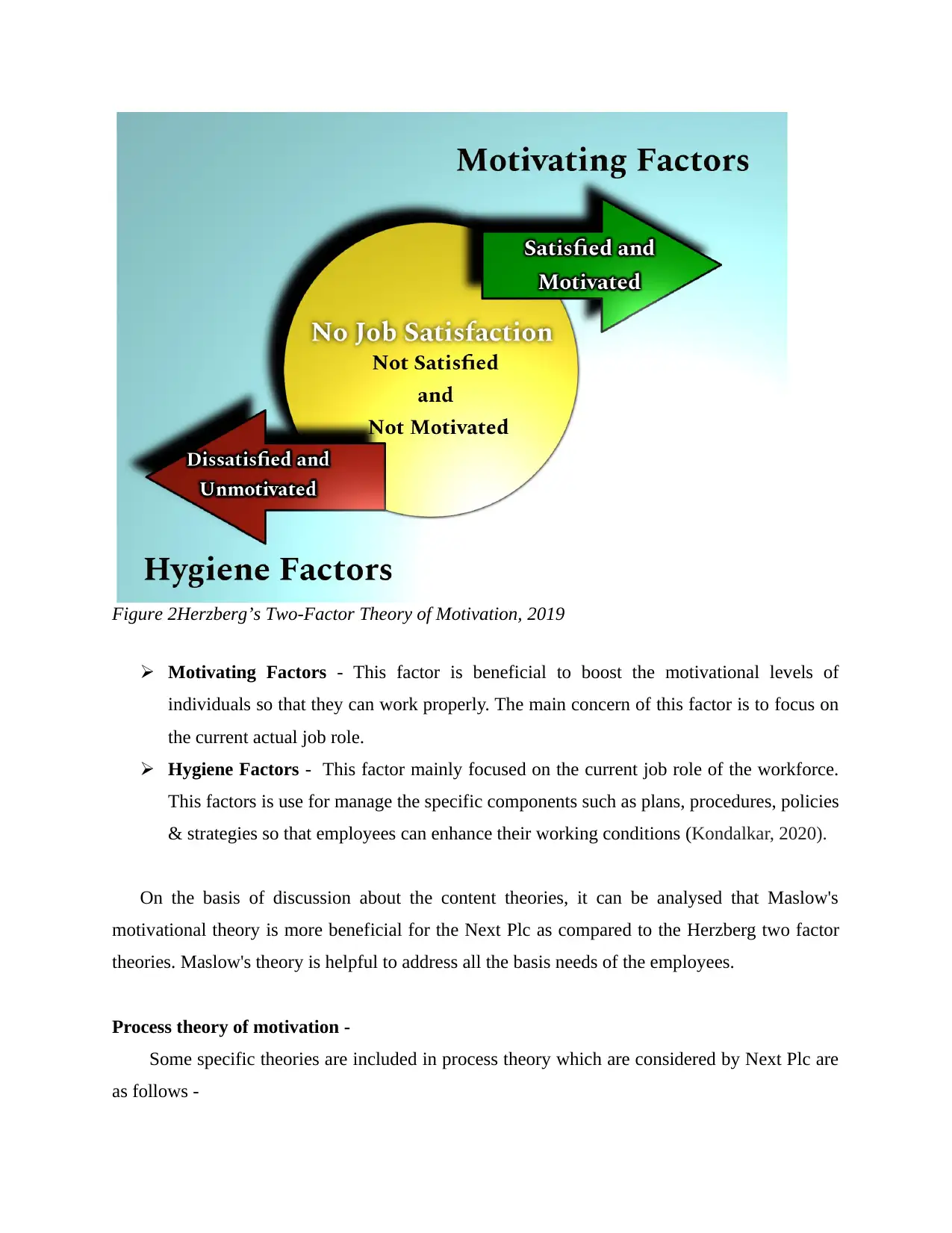
Figure 2Herzberg’s Two-Factor Theory of Motivation, 2019
Motivating Factors - This factor is beneficial to boost the motivational levels of
individuals so that they can work properly. The main concern of this factor is to focus on
the current actual job role.
Hygiene Factors - This factor mainly focused on the current job role of the workforce.
This factors is use for manage the specific components such as plans, procedures, policies
& strategies so that employees can enhance their working conditions (Kondalkar, 2020).
On the basis of discussion about the content theories, it can be analysed that Maslow's
motivational theory is more beneficial for the Next Plc as compared to the Herzberg two factor
theories. Maslow's theory is helpful to address all the basis needs of the employees.
Process theory of motivation -
Some specific theories are included in process theory which are considered by Next Plc are
as follows -
Motivating Factors - This factor is beneficial to boost the motivational levels of
individuals so that they can work properly. The main concern of this factor is to focus on
the current actual job role.
Hygiene Factors - This factor mainly focused on the current job role of the workforce.
This factors is use for manage the specific components such as plans, procedures, policies
& strategies so that employees can enhance their working conditions (Kondalkar, 2020).
On the basis of discussion about the content theories, it can be analysed that Maslow's
motivational theory is more beneficial for the Next Plc as compared to the Herzberg two factor
theories. Maslow's theory is helpful to address all the basis needs of the employees.
Process theory of motivation -
Some specific theories are included in process theory which are considered by Next Plc are
as follows -
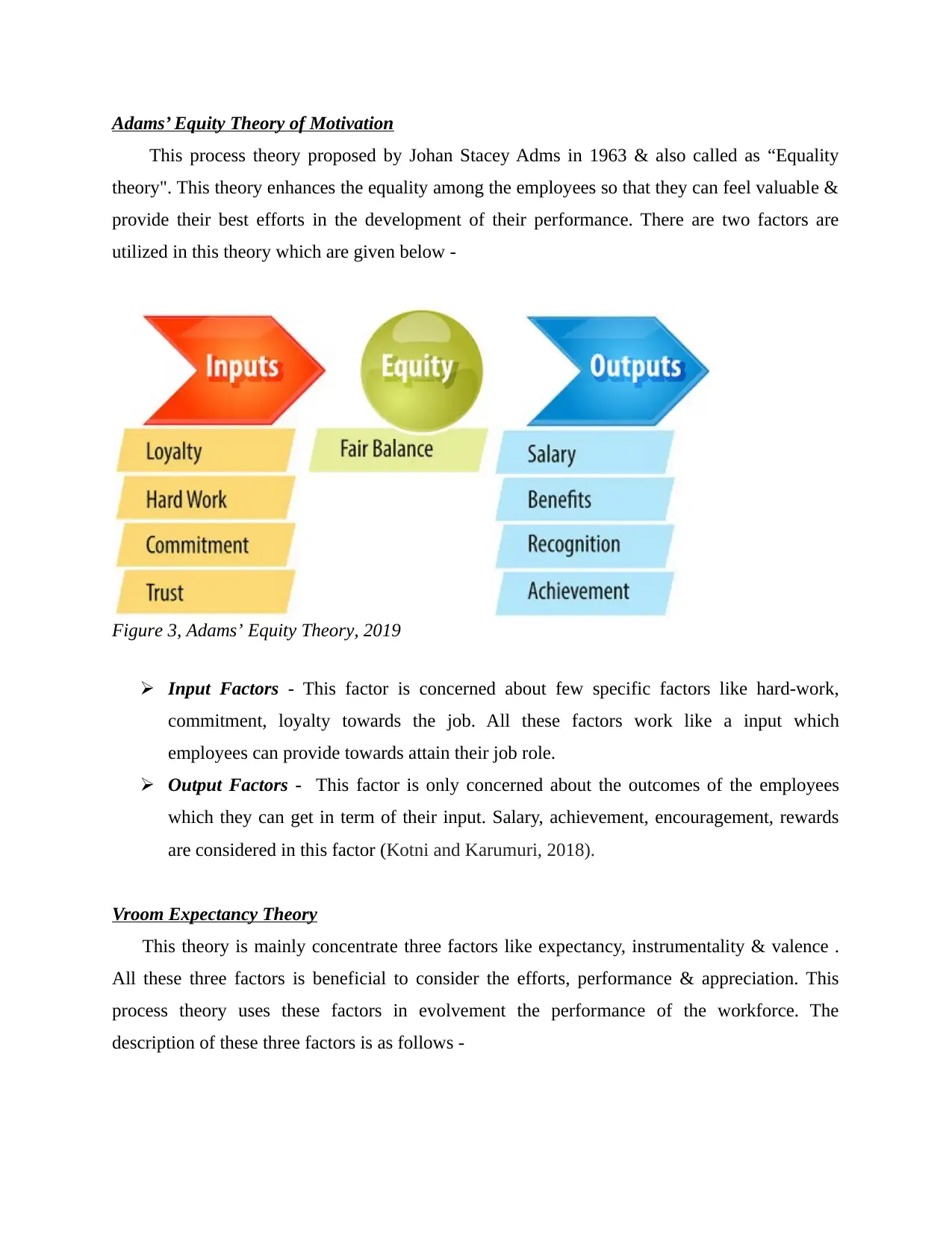
Adams’ Equity Theory of Motivation
This process theory proposed by Johan Stacey Adms in 1963 & also called as “Equality
theory". This theory enhances the equality among the employees so that they can feel valuable &
provide their best efforts in the development of their performance. There are two factors are
utilized in this theory which are given below -
Figure 3, Adams’ Equity Theory, 2019
Input Factors - This factor is concerned about few specific factors like hard-work,
commitment, loyalty towards the job. All these factors work like a input which
employees can provide towards attain their job role.
Output Factors - This factor is only concerned about the outcomes of the employees
which they can get in term of their input. Salary, achievement, encouragement, rewards
are considered in this factor (Kotni and Karumuri, 2018).
Vroom Expectancy Theory
This theory is mainly concentrate three factors like expectancy, instrumentality & valence .
All these three factors is beneficial to consider the efforts, performance & appreciation. This
process theory uses these factors in evolvement the performance of the workforce. The
description of these three factors is as follows -
This process theory proposed by Johan Stacey Adms in 1963 & also called as “Equality
theory". This theory enhances the equality among the employees so that they can feel valuable &
provide their best efforts in the development of their performance. There are two factors are
utilized in this theory which are given below -
Figure 3, Adams’ Equity Theory, 2019
Input Factors - This factor is concerned about few specific factors like hard-work,
commitment, loyalty towards the job. All these factors work like a input which
employees can provide towards attain their job role.
Output Factors - This factor is only concerned about the outcomes of the employees
which they can get in term of their input. Salary, achievement, encouragement, rewards
are considered in this factor (Kotni and Karumuri, 2018).
Vroom Expectancy Theory
This theory is mainly concentrate three factors like expectancy, instrumentality & valence .
All these three factors is beneficial to consider the efforts, performance & appreciation. This
process theory uses these factors in evolvement the performance of the workforce. The
description of these three factors is as follows -
⊘ This is a preview!⊘
Do you want full access?
Subscribe today to unlock all pages.

Trusted by 1+ million students worldwide

Illustr
ation 1: Expectancy Theory, 2018
Expectancy – The prime motive of this factor is to manage the efforts of the
workforce to set specific target and work hard to achieve the appropriate outcomes.
Instrumentality - This factor is mainly concerned about the performance level of the
workforce so that they can effectively develop their performance and improve their
effectiveness in order to gain appreciation & rewards.
Valence - This factor is specific concentrate on the achievements, appreciation,
encouragement, promotion employee can get desirable outcomes and received reward
of their hard work (Lee and Lu, 2020).
As per above discussion about the process theory, it can be evaluated that Vroom expectancy
theory is most useful & beneficial for Next Plc as compared to the Adam's Equity theory. Vroom
expectancy theory can improve the efforts of the employees to improve their performance so that
they can receive rewards of their best efforts which can improve the motivation level of the
employees.
ation 1: Expectancy Theory, 2018
Expectancy – The prime motive of this factor is to manage the efforts of the
workforce to set specific target and work hard to achieve the appropriate outcomes.
Instrumentality - This factor is mainly concerned about the performance level of the
workforce so that they can effectively develop their performance and improve their
effectiveness in order to gain appreciation & rewards.
Valence - This factor is specific concentrate on the achievements, appreciation,
encouragement, promotion employee can get desirable outcomes and received reward
of their hard work (Lee and Lu, 2020).
As per above discussion about the process theory, it can be evaluated that Vroom expectancy
theory is most useful & beneficial for Next Plc as compared to the Adam's Equity theory. Vroom
expectancy theory can improve the efforts of the employees to improve their performance so that
they can receive rewards of their best efforts which can improve the motivation level of the
employees.
Paraphrase This Document
Need a fresh take? Get an instant paraphrase of this document with our AI Paraphraser
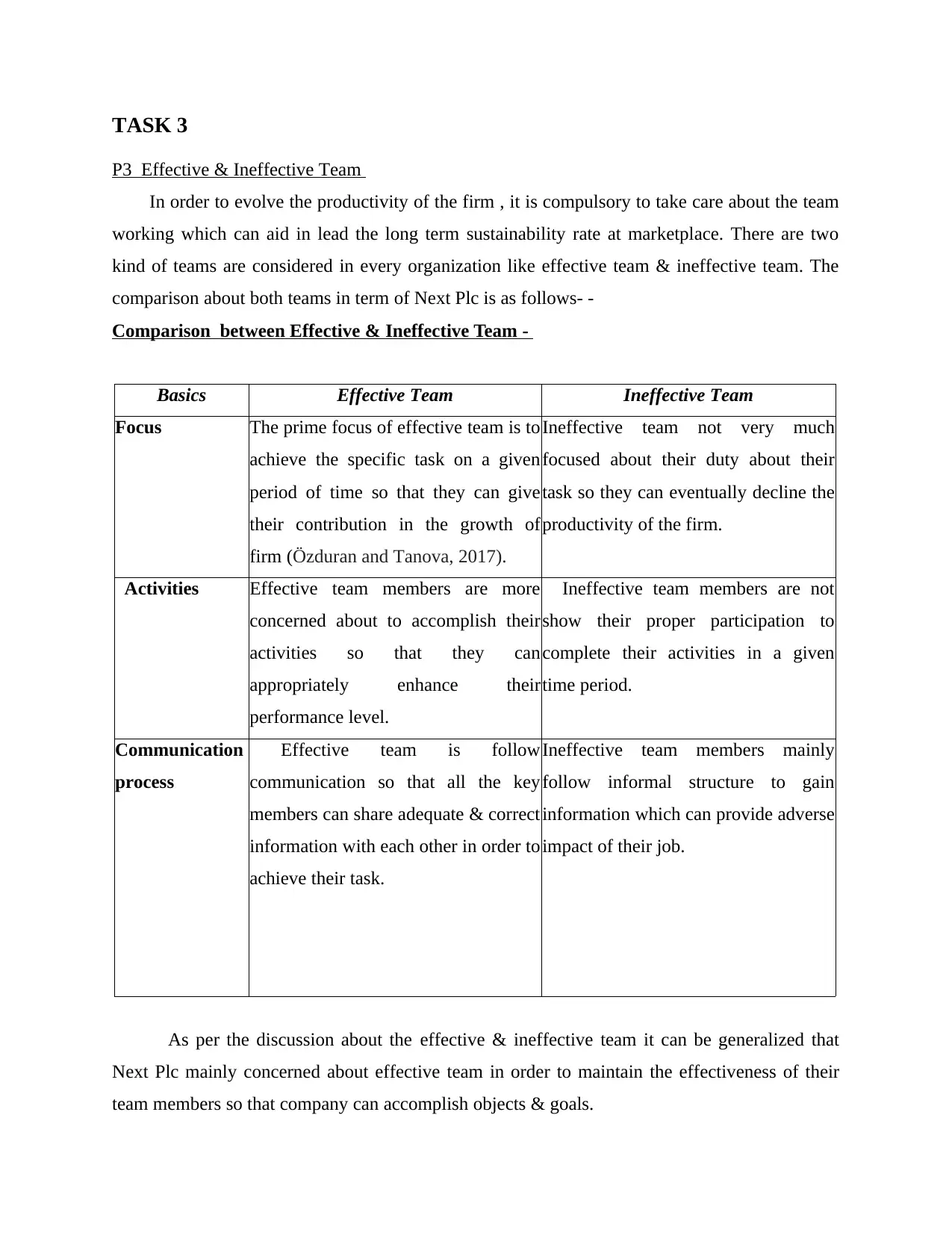
TASK 3
P3 Effective & Ineffective Team
In order to evolve the productivity of the firm , it is compulsory to take care about the team
working which can aid in lead the long term sustainability rate at marketplace. There are two
kind of teams are considered in every organization like effective team & ineffective team. The
comparison about both teams in term of Next Plc is as follows- -
Comparison between Effective & Ineffective Team -
Basics Effective Team Ineffective Team
Focus The prime focus of effective team is to
achieve the specific task on a given
period of time so that they can give
their contribution in the growth of
firm (Özduran and Tanova, 2017).
Ineffective team not very much
focused about their duty about their
task so they can eventually decline the
productivity of the firm.
Activities Effective team members are more
concerned about to accomplish their
activities so that they can
appropriately enhance their
performance level.
Ineffective team members are not
show their proper participation to
complete their activities in a given
time period.
Communication
process
Effective team is follow
communication so that all the key
members can share adequate & correct
information with each other in order to
achieve their task.
Ineffective team members mainly
follow informal structure to gain
information which can provide adverse
impact of their job.
As per the discussion about the effective & ineffective team it can be generalized that
Next Plc mainly concerned about effective team in order to maintain the effectiveness of their
team members so that company can accomplish objects & goals.
P3 Effective & Ineffective Team
In order to evolve the productivity of the firm , it is compulsory to take care about the team
working which can aid in lead the long term sustainability rate at marketplace. There are two
kind of teams are considered in every organization like effective team & ineffective team. The
comparison about both teams in term of Next Plc is as follows- -
Comparison between Effective & Ineffective Team -
Basics Effective Team Ineffective Team
Focus The prime focus of effective team is to
achieve the specific task on a given
period of time so that they can give
their contribution in the growth of
firm (Özduran and Tanova, 2017).
Ineffective team not very much
focused about their duty about their
task so they can eventually decline the
productivity of the firm.
Activities Effective team members are more
concerned about to accomplish their
activities so that they can
appropriately enhance their
performance level.
Ineffective team members are not
show their proper participation to
complete their activities in a given
time period.
Communication
process
Effective team is follow
communication so that all the key
members can share adequate & correct
information with each other in order to
achieve their task.
Ineffective team members mainly
follow informal structure to gain
information which can provide adverse
impact of their job.
As per the discussion about the effective & ineffective team it can be generalized that
Next Plc mainly concerned about effective team in order to maintain the effectiveness of their
team members so that company can accomplish objects & goals.
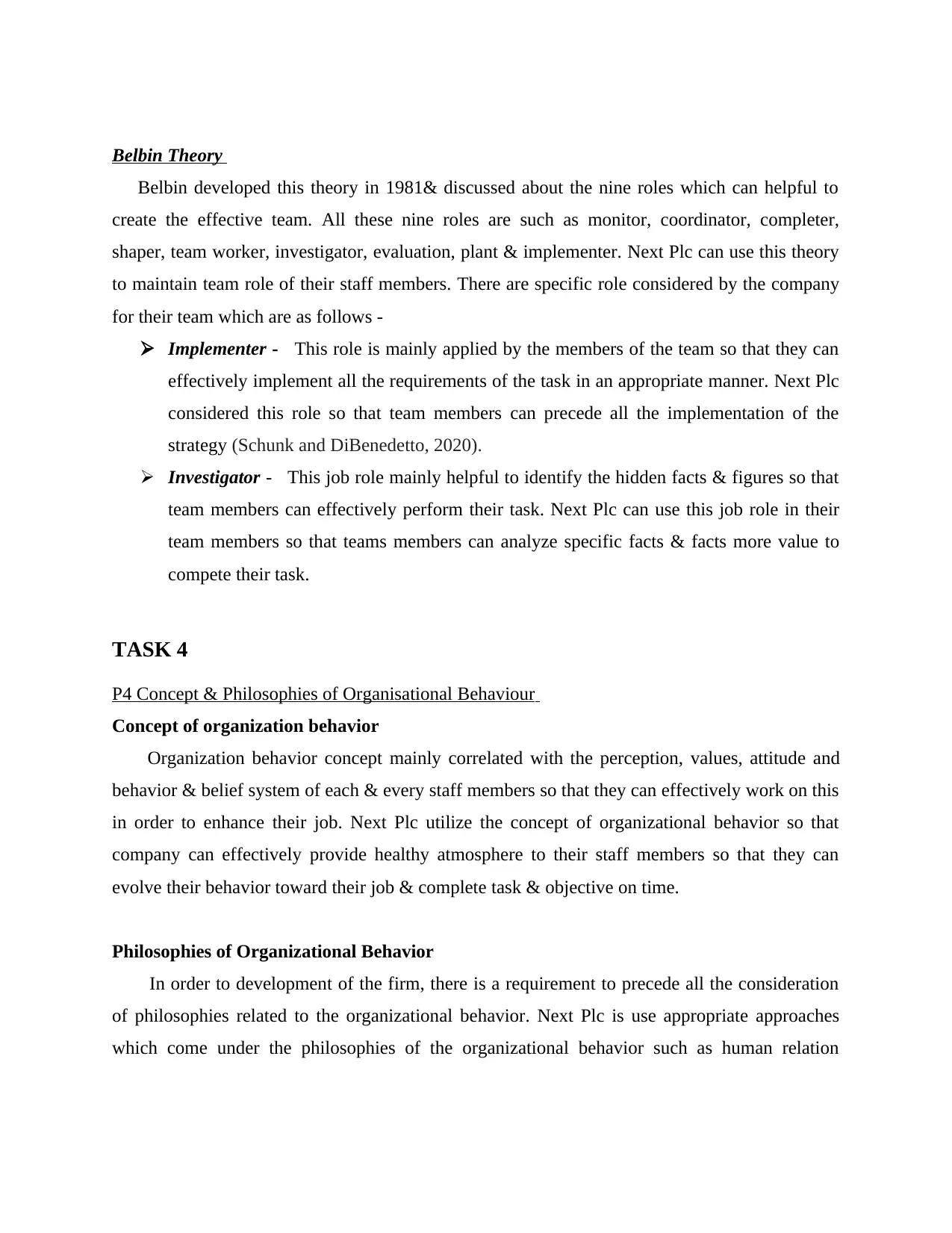
Belbin Theory
Belbin developed this theory in 1981& discussed about the nine roles which can helpful to
create the effective team. All these nine roles are such as monitor, coordinator, completer,
shaper, team worker, investigator, evaluation, plant & implementer. Next Plc can use this theory
to maintain team role of their staff members. There are specific role considered by the company
for their team which are as follows -
Implementer - This role is mainly applied by the members of the team so that they can
effectively implement all the requirements of the task in an appropriate manner. Next Plc
considered this role so that team members can precede all the implementation of the
strategy (Schunk and DiBenedetto, 2020).
Investigator - This job role mainly helpful to identify the hidden facts & figures so that
team members can effectively perform their task. Next Plc can use this job role in their
team members so that teams members can analyze specific facts & facts more value to
compete their task.
TASK 4
P4 Concept & Philosophies of Organisational Behaviour
Concept of organization behavior
Organization behavior concept mainly correlated with the perception, values, attitude and
behavior & belief system of each & every staff members so that they can effectively work on this
in order to enhance their job. Next Plc utilize the concept of organizational behavior so that
company can effectively provide healthy atmosphere to their staff members so that they can
evolve their behavior toward their job & complete task & objective on time.
Philosophies of Organizational Behavior
In order to development of the firm, there is a requirement to precede all the consideration
of philosophies related to the organizational behavior. Next Plc is use appropriate approaches
which come under the philosophies of the organizational behavior such as human relation
Belbin developed this theory in 1981& discussed about the nine roles which can helpful to
create the effective team. All these nine roles are such as monitor, coordinator, completer,
shaper, team worker, investigator, evaluation, plant & implementer. Next Plc can use this theory
to maintain team role of their staff members. There are specific role considered by the company
for their team which are as follows -
Implementer - This role is mainly applied by the members of the team so that they can
effectively implement all the requirements of the task in an appropriate manner. Next Plc
considered this role so that team members can precede all the implementation of the
strategy (Schunk and DiBenedetto, 2020).
Investigator - This job role mainly helpful to identify the hidden facts & figures so that
team members can effectively perform their task. Next Plc can use this job role in their
team members so that teams members can analyze specific facts & facts more value to
compete their task.
TASK 4
P4 Concept & Philosophies of Organisational Behaviour
Concept of organization behavior
Organization behavior concept mainly correlated with the perception, values, attitude and
behavior & belief system of each & every staff members so that they can effectively work on this
in order to enhance their job. Next Plc utilize the concept of organizational behavior so that
company can effectively provide healthy atmosphere to their staff members so that they can
evolve their behavior toward their job & complete task & objective on time.
Philosophies of Organizational Behavior
In order to development of the firm, there is a requirement to precede all the consideration
of philosophies related to the organizational behavior. Next Plc is use appropriate approaches
which come under the philosophies of the organizational behavior such as human relation
⊘ This is a preview!⊘
Do you want full access?
Subscribe today to unlock all pages.

Trusted by 1+ million students worldwide
1 out of 16
Related Documents
Your All-in-One AI-Powered Toolkit for Academic Success.
+13062052269
info@desklib.com
Available 24*7 on WhatsApp / Email
![[object Object]](/_next/static/media/star-bottom.7253800d.svg)
Unlock your academic potential
Copyright © 2020–2026 A2Z Services. All Rights Reserved. Developed and managed by ZUCOL.





